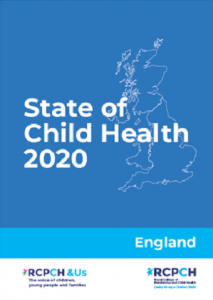iHV welcomes today’s publication of the Royal College of Paediatrics and Child Health (RCPCH) report, State of Child Health 2020, the largest ever compilation of data on the health of babies, children and young people across all four UK nations.
The report shows that for many measures of children’s health and wellbeing, progress has stalled, or is in reverse – something rarely seen in high income countries.
Across most indicators, health outcomes are worse for children who live in deprived areas. Inequalities in some outcomes have widened since the last State of Child Health report in 2017. Progress has also been seriously affected by deep cuts to local authority budgets – used to finance public health initiatives and community services.
Commenting on the launch of the State of Child Health 2020, Dr Cheryll Adams CBE, Executive Director of the iHV, said:
“The results of this report make very sad reading. They build on the evidence base from the recent Marmot 10 years on report and our own latest published research with the health visiting workforce. The State of Child Health 2020 recommendations are excellent and now need to be implemented by ministers. You don’t get a second chance with children – those most disadvantaged today, will be drawing disproportionately on health and wellbeing services tomorrow.
“If the government has any ambition to leave the country in a better place than it was in when they picked up the reins, they must listen and respond quickly to all these recent reports. Our most vulnerable citizens are becoming more vulnerable and only government can change that. Children really can’t wait. Already, many children face uncertain futures as their families haven’t received vital support during their early years.
“It is positive to see health visiting identified as a solution in the RCPCH report. Yes, it is a solution, but very urgent action is required to reinvest into public health before the implications of not doing so become even more stark.”
State of Child Health 2020 brings together 28 measures of health outcomes, ranging from specific conditions – such as asthma, epilepsy, and mental health problems – to risk factors for poor health such as poverty, low rates of breastfeeding, and obesity.
The authors make a number of policy recommendations for each nation. For England, these include:
- Introduce a cross-departmental National Child Health and Wellbeing Strategy to address and monitor child poverty and health inequalities.
- Restore £1 billion of real-terms cuts to the public health grant for Local Authorities.
- Ensure future investment in public health provision increases at the same rate as NHS funding and is allocated based on population health needs.
- Implement in full commitments from the prevention green paper, Advancing our health: Prevention in the 2020s.
- Implement commitments to provide a Youth Investment Fund, with protection of the committed £500m funding.
- Provide health-based support for children throughout education, including funding for increased numbers of school nurses and school counsellors.
- Provide renewed investment in services for children and families, which support the child’s school readiness.
- Ensure that health visiting services are protected, supported and expanded with clear and secure funding.



